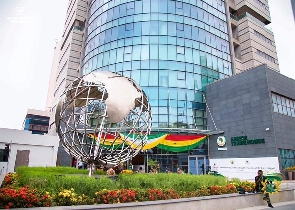
[ad_1]
 The AfCFTA Secretariat is located in Ghana-West Africa
The AfCFTA Secretariat is located in Ghana-West Africa
The African Continental Free Trade Area (AfCFTA) has established and implemented a dispute settlement body under the dispute settlement protocol.
The AfCFTA Dispute Settlement Body Protocol has been carefully negotiated by member states, following extensive consultations to ensure full commitment to its implementation.
The Body is composed of representatives of all States parties and monitors and evaluates the functions of the dispute settlement mechanism.
It must be fast, efficient, rules-based and transparent.
AfCFTA Secretary General Wamkele Mene announced it during the quarterly press conference on AfCFTA and its achievements, status of implementation and next steps in Accra on Friday.
The press conference also aimed to improve public understanding of the Accord’s mandate – the advocacy role – to communicate on the AfCFTA status report; policies, outcomes of strategic meetings, performance of missions and bilateral strategic outcomes.
It is also about providing a platform for engagement between AfCFTA and the media and building a lasting and visible brand presence of AfCFTA to the public.
He said that currently they are piloting the Pan African Payment and Settlement System (PAPSS) in six West African countries, including Ghana, Nigeria, Gambia and Sierra Leone.
The PAPSS is a centralized payment and settlement infrastructure for intra-African trade and payments.
The platform, which is being developed in collaboration with the African Import-Export Bank (Afreximbank), would facilitate payments and formalize some unregistered trade due to the prevalence of informal cross-border trade in Africa.
He said the system aims to reduce dependence on foreign currencies when trading under the deal and expressed hope that the PAPSS will be ready by the end of 2021 to facilitate trade between countries. .
It would also provide an alternative to the current long and expensive correspondent banking relationships to facilitate trade and other economic activities between African countries through a simple, inexpensive and risk-controlled payment clearing and settlement system.
The benefits of PAPPS for cross-border payments include lower costs; reduction of duration and temporal variability; the reduction in the liquidity needs of commercial banks; the reduction in central banks’ liquidity needs for settlement as well as its payments; and strengthening central bank oversight of cross-border payment systems.
The Secretary General said they were in the final stages and preparations to launch the AfCFTA adjustment facility to mitigate the possible negative impact on revenues resulting from the implementation of the Agreement.
“All the structures of the implementing and negotiating institutions have been established in accordance with the agreement, including the standing committee for phase two issues,” he added.
He said the AfCFTA Secretariat had an advocacy and stakeholder engagement program and missions in Egypt, Nigeria, Tanzania, DRC and Angola to strengthen the relationship between the Secretariat and heads of State, the Ministers of Foreign Affairs and Trade.
Mr Mene said the missions would also engage respective stakeholders to advocate and educate on the AfCFTA deal and engage while using the opportunity to create communication platforms with youth and women parties. stakeholders and position the brand.
He said the number of ratified countries rose to 40 with the recent ratification from Zambia, Malawi, Algeria and Burundi.
Watch the latest edition of BizTech on what’s going on in car production and assembly in Ghana below:
Source link